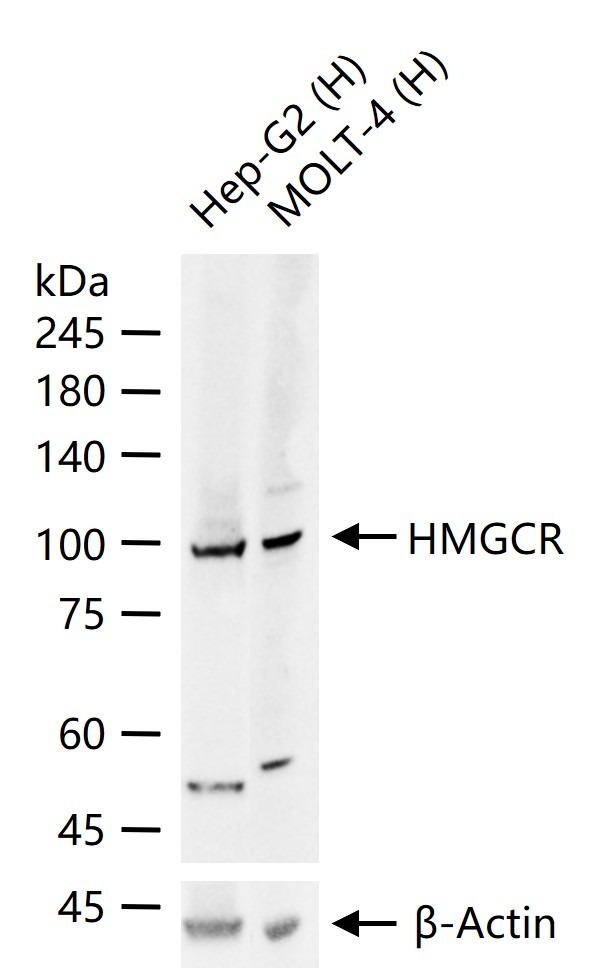Shopping Cart
Remove All Your shopping cart is currently empty
Your shopping cart is currently empty
Anti-HMGCR Antibody (7G912) is a Rabbit antibody targeting HMGCR. Anti-HMGCR Antibody (7G912) can be used in WB.
| Pack Size | Price | USA Warehouse | Global Warehouse | Quantity |
|---|---|---|---|---|
| 25 μL | $154 | 7-10 days | 7-10 days | |
| 50 μL | $271 | 7-10 days | 7-10 days | |
| 100 μL | $489 | 7-10 days | 7-10 days |
| Description | Anti-HMGCR Antibody (7G912) is a Rabbit antibody targeting HMGCR. Anti-HMGCR Antibody (7G912) can be used in WB. |
| Synonyms | HMGCR, HMG-CoA reductase, 3-hydroxy-3-methylglutaryl-coenzyme A reductase |
| Ig Type | IgG |
| Clone | 7G912 |
| Reactivity | Human |
| Verified Activity | 25 μg total protein per Lane of various lysates probed with HMGCR monoclonal antibody, unconjugated (TMAB-00873) at 1:1000 dilution and 4°C overnight incubation. Followed by conjugated secondary antibody incubation at RT for 60 min.  |
| Application | |
| Recommended Dose | WB=1:1000-5000 |
| Antibody Type | Monoclonal |
| Host Species | Rabbit |
| Subcellular Localization | Endoplasmic reticulum membrane. Peroxisome membrane. |
| Construction | Recombinant Antibody |
| Purification | Protein A purified |
| Appearance | Liquid |
| Formulation | 0.01M TBS (pH7.4) with 1% BSA, 0.02% Proclin300 and 50% Glycerol. |
| Concentration | 1 mg/mL |
| Research Background | HMG-CoA reductase is the rate-limiting enzyme for cholesterol synthesis and is regulated via a negative feedback mechanism mediated by sterols and non-sterol metabolites derived from mevalonate, the product of the reaction catalyzed by reductase. Normally in mammalian cells this enzyme is suppressed by cholesterol derived from the internalization and degradation of low density lipoprotein (LDL) via the LDL receptor. Competitive inhibitors of the reductase induce the expression of LDL receptors in the liver, which in turn increases the catabolism of plasma LDL and lowers the plasma concentration of cholesterol, an important determinant of atherosclerosis. Alternatively spliced transcript variants encoding different isoforms have been found for this gene. [provided by RefSeq]. |
| Immunogen | A synthesized peptide: human HMGCR |
| Antigen Species | Human |
| Gene Name | HMGCR |
| Gene ID | |
| Protein Name | 3-hydroxy-3-methylglutaryl-coenzyme A reductase |
| Uniprot ID | |
| Biology Area | Metabolism of lipids and lipoproteins,Lipoprotein metabolism,Cholesterol Metabolism,Cholesterol Metabolism,Lipid metabolism,Lipoprotein metabolism,Heart disease,Lipid metabolism |
| Function | This transmembrane glycoprotein is involved in the control of cholesterol biosynthesis. It is the rate-limiting enzyme of sterol biosynthesis. |
| Molecular Weight | Theoretical: 97 kDa. |
| Stability & Storage | Store at -20°C or -80°C for 12 months. Avoid repeated freeze-thaw cycles. |
| Transport | Shipping with blue ice. |
| Size | Quantity | Unit Price | Amount | Operation |
|---|

Copyright © 2015-2026 TargetMol Chemicals Inc. All Rights Reserved.